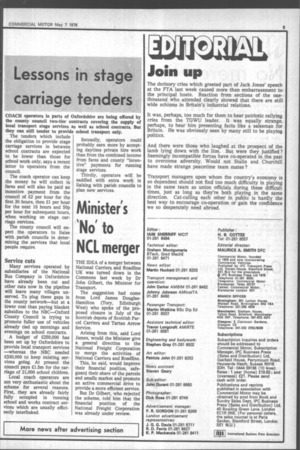Lessons in stage carriage tenders
Page 7

If you've noticed an error in this article please click here to report it so we can fix it.
COACH operators in parts of Oxfordshire are being offered by the county council two-tier contracts covering the supply of local transport stage services as well as school contracts. But they can still tender to provide school transport only.
The tenders which include the obligation to provide stage carriage services in between school contracts are expected to be lower than those for school work only, says a recent letter to operators from the council.
The coach operator can keep the money he will collect in fares and will also be paid an incentive payment from the council of £2 per hour for the first 30 hours, then £1 per hour for the next 10 hours and 50p per hour for subsequent hours, when working on stage carriage services.
The county council will expect the operators to liaise with parish councils in determining the services that local people require.
Service cuts
Many services operated by subsidiaries of the National Bus Company in Oxfordshire have already been cut and other cuts now in the pipeline will leave many villages unserved. To plug these gaps in the county network—but at a lower cost than paying blanket subsidies to the NBC—Oxford County Council is trying to promote fuller use of vehicles already tied up mornings and evenings on school contracts.
A budget of £250,000 has been set up by Oxfordshire to provide local transport services —whereas the NBC needed £330,000 to keep existing services going. At present the council pays £1.5m for the carriage of 21,000 school children.
Local coach operators are not very enthusiastic about the scheme for several reasons. First, they are already fairly fully occupied in running school and works contract services which are usually efficiently interlinked. Secondly, operators could probably earn more by accepting daytime private hire work than from the combined income from fares and county "incentive" payments for running stage services.
Thirdly, operators will be saddled with extra work in liaising with parish councils to plan new services.




























































































